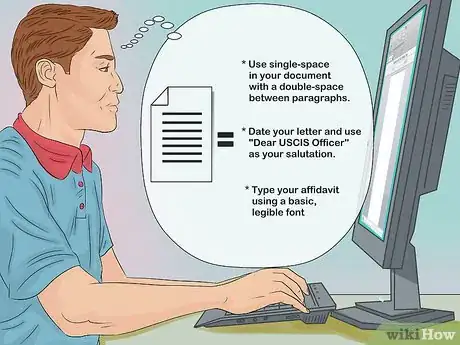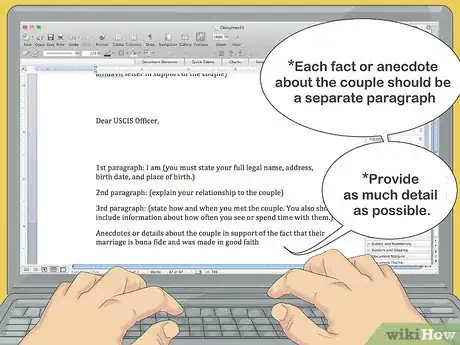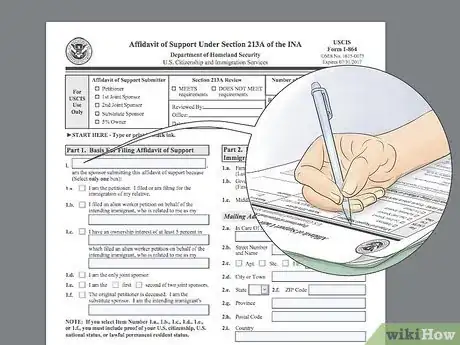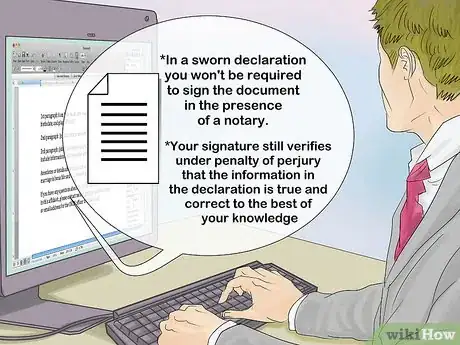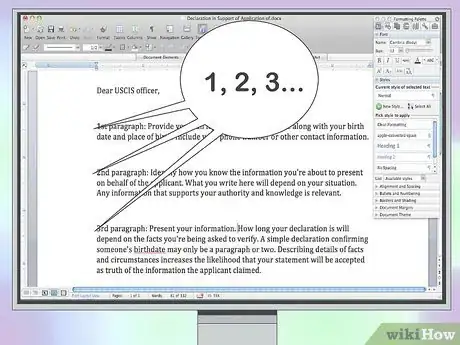This article was written by David Katona and by wikiHow staff writer, Jennifer Mueller, JD. David Katona is an Immigration Lawyer and the Founder of Katona & Associates PLLC in New York City. With over 20 years of experience, he specializes in business immigration and green card sponsorship. He earned a law degree from American University Washington College of Law, a Master of International Affairs from American University’s School of International Service, and a BS in Business from Wake Forest University. Super Lawyers named him a Super Lawyer - Business Immigration in 2014, 2016-2022, and a Rising Star - Business Immigration in 2011. His firm was also rated by Best Lawyers as a Tier 1 immigration firm in NYC and Tier 2 nationally from 2020-2023. David is a member of the American Immigration Lawyers Association (AILA) and the NYC Bar Association.
There are 10 references cited in this article, which can be found at the bottom of the page.
wikiHow marks an article as reader-approved once it receives enough positive feedback. In this case, 83% of readers who voted found the article helpful, earning it our reader-approved status.
This article has been viewed 267,437 times.
If someone you know is immigrating to the United States, you might need to write an affidavit letter – a written statement you submit under oath that the facts within it are true. There are several situations in which someone you know who is in the process of immigration may want you to write an affidavit letter on his or her behalf. Typically, you write an affidavit because you are pledging to support the new immigrant financially, or to back up the immigrant's claim that his or her marriage was made in good faith. You also might be asked to write a sworn declaration regarding facts or information about the immigrant for which appropriate legal documentation is unavailable.
Steps
Writing an I-751 Affidavit
-
1Talk to the person immigrating to the U.S. The person for whom you write an affidavit should be someone you know very well.
- Typically you would be asked to write an affidavit if you are close to the couple and have spent a lot of time with them. In the affidavit, you will relate facts or circumstances that support their marriage as a legitimate one, rather than simply a marriage of convenience to obtain U.S. permanent residency or citizenship.[1] [2]
- Additionally, you may be asked to write an affidavit if you are a close family member of the couple, or a religious leader who knows the couple well.[3]
- Although affidavits aren't required by U.S. Citizenship and Immigration Services (USCIS), most immigration attorneys recommend submitting several affidavits along with the petition for permanent residency.[4]
- While your affidavit doesn't necessarily provide objective proof to the USCIS of the couple's relationship, it does demonstrate that the couple happily lives together and is planning for the future.[5]
-
2Outline your facts. Before you start writing your affidavit, you should outline the points you want to make about the couple's relationship.
- You may be able to find sample affidavits, or the person for whom you're writing the affidavit may provide you with one. However, you should only use any samples you have as a guide to the types of information that can be included in your affidavit – don't copy them directly.[6]
- You may want to review documents or talk to your friends to make sure you have dates and times correct. For example, if you went to the couple's wedding, you may double-check with the couple to make sure you have the date of the wedding correct.
- Ultimately, you want to present facts and observations that cause you to believe that the couple is sincerely in love and intends to remain together.[7]
- In some cases, the couple is no longer together. Affidavits still can be used to demonstrate the good faith intent of the immigrant candidate, even though the relationship itself didn't last. In these situations, you may include your understanding of the reasons the couple split. If spousal abuse was involved, you may have observed altercations between the couple.[8]
Advertisement -
3Format your document. When writing your affidavit, you can use the standard legal format for affidavits, or you can format it as a traditional business letter.[9]
- The person for whom you're writing the affidavit, or their attorney, may have a format they prefer you to use. If they have a preference, you should use that format. Otherwise, you can choose the format with which you're most comfortable.
- Regardless of which format you choose, you should single-space your document with a double-space between paragraphs.
- Your word-processing application should have a template for business letter format. Date your letter and use "Dear USCIS Officer" as your salutation.[10]
- If you decide to use business letter format, you should include your name and address at the top, as well as the title and address for the USCIS service center where the letter will be submitted. You can get this information from the person for whom you're writing the affidavit.[11]
- If you're using the legal format, each paragraph should relate a single point or fact. Number your paragraphs sequentially.[12]
- Type your affidavit using a basic, legible font – the default font on your word-processing application typically is fine.
-
4Title your affidavit. Your title should be bolded at the top of the page and explain the purpose of the affidavit.[13]
- If you're using business letter format, your title will be the subject line of your letter.
- Generally, you should use the names of the couple and state that what follows is an affidavit letter in support of them.[14]
-
5Identify yourself. In your first paragraph, you must state your full legal name, address, birth date, and place of birth.
- If you're using the legal format, use the second paragraph to explain your relationship to the couple. In the third, state how and when you met the couple. You also should include information about how often you see the couple.
- In business letter format, you can include all of this information in a single paragraph.[15] [16]
- Indicate how long you've known the couple as well as how often you spend time with them.[17] For example, if you attend the same church as the couple, you may write that you see them at church services twice a week.
-
6Present your facts in separate paragraphs. Each fact or anecdote about the couple should be a separate paragraph, although if you're using business letter format your paragraphs typically will be longer than if you use legal format.[18]
- If you're using legal format, each paragraph should be numbered. Your paragraphs may be no more than a sentence or two.
- Provide as much detail as possible. The more details and specifics such as dates and locations you can include, the stronger your affidavit supports the couple. Remember the point of your affidavit is to support the fact that their marriage is bona fide and was made in good faith – not solely so the person for whom you're writing the affidavit could obtain U.S. citizenship.
-
7Close your affidavit. If you want, you can provide a phone number or email address for the USCIS officer to contact you if he or she has any questions about any of the information contained in your affidavit.[19]
- Before your signature, type a sentence that reads "I swear, under penalty of perjury, that the foregoing is true and correct to the best of my knowledge." Leave a few lines blank for your signature, then type your full legal name.[20]
-
8Sign your affidavit in the presence of a notary. Although it isn't required, you may want to use a notary to confirm your identification and validate your signature.[21]
- Generally, use of a notary public to authenticate the signature is the difference between an affidavit and a sworn declaration. Both documents, however, are signed under oath and penalty of perjury.[22]
- You typically can find a notary public at a bank or courthouse. You may have to pay a small fee for the notary's services.
- When using legal affidavit format, signing in the presence of a notary is required. However, legal affidavit form is not required – you can simply write a letter and present it as a sworn declaration. Affidavits are more formal than sworn declarations.[23]
-
9Submit your affidavit. Typically when you've completed the affidavit you will give it to your friend, or to your friend's attorney.
- If your friend has an attorney, he or she will review your affidavit to make sure it actually will support your friend's petition and will be beneficial to your friend's case.
- In some cases, you may be called to testify before a USCIS officer regarding the information contained in your affidavit.[24]
Writing an Affidavit of Support
-
1Determine if you need to file an affidavit of support. Typically you would file an affidavit of support if you are the petitioner of an immigrant petition for a family member.[25]
- The affidavit is a legally enforceable document in which you promise to be financially responsible for the person immigrating to the U.S. This responsibility typically lasts until the person achieves full citizenship or has been working in the U.S. for ten years.[26]
- The affidavit is required if the person moving to the U.S. from another country has immediate relatives who already are U.S. citizens. It also may be available for employment-based immigration if the person files an immigrant visa application.[27]
- If you filed an immigrant visa petition on behalf of an immediate relative, you also must be his or her sponsor. You're eligible to be an immigrant's sponsor if you are 18 years of age or older, are a U.S. citizen or permanent resident, and actually live in the U.S.[28]
- Joint sponsors, unlike sponsors, do not have to be related to the immigrant. They still must be 18 or older and meet the same citizenship and residency requirements.[29]
-
2
-
3Complete your form. To fill out the form, you must answer all questions completely and type or print in black ink.[34]
- The form requires information about you, your relationship to the applicant, your basis for filing the affidavit, information about the immigrant you are sponsoring, and information about your qualifications to be an immigrant sponsor.[35]
- If you need extra space to write your answer, you can use the "Additional Information" area provided with the form or attach separate sheets of paper. The separate paper should include your name and identify the item from the affidavit to which the answer refers.[36]
- You must meet certain income requirements to be a sponsor for an immigrant. Generally, you must have a household income that exceeds 125 percent of the U.S. poverty level for your household's size. You can determine if you meet those requirements by filling out Form I-864P.[37]
- If you do not meet the income requirements to become a sponsor, you may have other options such as including the cash value of your assets or including the income of other household members. Those people must be related to you either by birth, marriage, or adoption, and must fill out Form I-864A.[38]
-
4Assemble supporting documents. Certain documents or copies of documents are required to provide evidence of statements made in your affidavit.
- In some cases, you can submit a photocopy of the requested documents, although some require originals. You should read the instructions carefully to determine which is required.[39]
- If you submit a photocopy, the USCIS may still request to see the original at any time while the immigrant's application is being processed.[40]
- You must provide proof that you are a U.S. citizen, U.S. national, or lawful permanent resident. Documents that prove citizenship status include a copy of your birth certificate, certificate of naturalization, or U.S. passport.[41]
- You also must provide an IRS transcript or copy of your tax return for the previous year as proof of income.[42]
-
5Sign your affidavit. You must either sign your affidavit in front of a notary public in the U.S., or in front of a U.S. consular or immigration officer.[43]
- Keep in mind that you are signing your affidavit under oath. If you include information on the affidavit that is false, you may be liable for criminal prosecution in the U.S.[44]
- You also may be subject to fines if you don't report a change of address if you happen to move at any time between the submission of your affidavit and the final resolution of the immigrant's application.[45]
-
6Submit your form to the appropriate agency. Where you need to send your completed affidavit will depend on whether you are the petitioner-sponsor or a joint sponsor and whether the person for whom you wrote the affidavit is seeking an immigrant visa or an adjustment of status.[46] [47]
- If you are a joint sponsor, you should give your affidavit directly to the applicant rather than sending it to a government agency. He or she will then send the form to the consular office for review.[48]
- Typically you must submit your form either after your relative has been scheduled for an immigrant visa interview, or when he or she applies for an adjustment of status with the USCIS from within the U.S.[49]
- You generally will give your completed form and documents to the person for whom you wrote the affidavit. However, if the form was mailed to you by the NVC with instructions to return it, you should follow those instructions.[50]
- You also may have to pay a filing fee, depending on whether your documents are being filed with the NVC or with USCIS.[51] For example, if filing your affidavit with the NVC from within the U.S., you must pay a $120 fee.[52]
- The USCIS or NVC will review your affidavit and make sure it's complete. You may be called for an interview with a USCIS officer to discuss the information included in your affidavit.[53]
Writing a Sworn Declaration
-
1Talk to the person immigrating to the U.S. Before you write your sworn declaration, you need to know the information for which the person needs supplemental documentation.
- Certain personal documents such as a birth certificate must be provided when someone applies for immigration to the U.S. However, in some cases these documents may be unavailable or impossible to obtain. For example, the facility where birth certificates were stored may have burned down, or the immigrant may live in a war-torn area where government authority was non-existent when he or she was born and such documents were never created.[54]
- If an applicant cannot obtain certain types of required documents, USCIS will accept sworn declarations as substitutes. The applicant also must include a sworn declaration regarding why the original document is unavailable.[55]
- An immigration applicant may need a sworn declaration from you because you have first-hand knowledge of the facts that would be proven by the document. For example, you may be able to confirm the person's birthdate or place of birth.[56]
- Additionally, if you are a government worker in the person's home country, you may be called upon to write a sworn declaration explaining why the original document required for the person's immigration application is not available.[57]
-
2Outline the facts. Before you write your sworn declaration, plan it out so the information is organized and flows well in your final document.
- The information you include will depend on the purpose of your declaration. Generally, you should not include facts for which you do not have first-hand knowledge.[58] For example, if you know the person for whom you're writing the declaration was born on July 4, 1984 because he told you so, this isn't sufficient knowledge to prove the accuracy of his birthdate. However, if you were present at his birth – maybe you were a nurse or the doctor who delivered him – that first-hand knowledge would support his claim regarding his date of birth.
- Include as many details as possible. Specific details about the necessary facts that support the person's application are more important than any formal wording, legal terms, or fancy formatting.[59]
-
3Format your document. You may write a sworn declaration either in business letter format, or using the traditional format for a legal affidavit.
- If the person for whom you're writing the declaration has an attorney, there may be a particular format he or she prefers. Additionally, you may be able to find sample declarations online that you can use as guides. However, you should be careful about copying language from sample declarations that doesn't apply to your particular situation.
- Regardless of the format you use, a sworn declaration isn't technically an affidavit since you won't be required to sign the document in the presence of a notary. However, your signature still verifies under penalty of perjury that the information in the declaration is true and correct to the best of your knowledge.[60]
- In both formats, the text is single-spaced with a double-space between paragraphs. Use a basic, legible font such as the default font for your word-processing application.
-
4Title your declaration. The title tells the USCIS officer what the document is and the name of the immigrant to whom it relates.
- For example, your title might be "Declaration in Support of Application of ..." with the applicant's full legal name as it appears on his or her immigration application.[61]
- If you're writing a business letter, the title becomes the subject line of your letter, but it should contain the same information.
-
5Identify yourself. You must begin your declaration by providing your full legal name and residence along with your birth date and place of birth.
- Include your phone number or other contact information in case the USCIS officer who reviews your declaration needs to contact you for further information or wants to schedule an interview to discuss your declaration.[62]
- You should next identify how you know the information you're about to present on behalf of the applicant. What you write here will depend on your situation. For example, if you're writing to support the applicant's birth date because you were the doctor who delivered her, you would state that you were a doctor in the town where she was born. You might also include information about how long you had been a doctor or hospitals where you worked. Any information that supports your authority and knowledge is relevant.[63] [64]
-
6Present your facts in numbered paragraphs. If you are using the traditional legal format for an affidavit, the paragraphs should be numbered. However, if you're using a business letter format, you can present your facts in a basic narrative style.
- How long your declaration is will depend on the facts you're being asked to verify. A simple declaration confirming someone's birthdate may only be a paragraph or two. However, if you're asked to write a declaration in support of the fact that the applicant is no longer married because his wife died, you may have to write a substantially longer declaration to include all the details and relate how you have first-hand knowledge of those facts.[65]
- Describing details of facts and circumstances increases the likelihood that your statement will be accepted as truth of the information the applicant claimed. Therefore, you should include as many details as you can remember, regardless of whether you believe they are relevant.[66]
-
7Close your declaration. You must close your declaration with a statement that the declaration was signed under oath.
- The standard wording is "I swear, under penalty of perjury, that the foregoing is true and correct to the best of my knowledge."[67]
- Skip a few lines under this statement for your signature, then type your full legal name and leave another space to enter the date by hand when you sign your declaration.[68]
-
8Print and sign your declaration. After you've finalized your declaration, you may wish to print a copy for your records. Then you typically submit it either to the person for whom you wrote the declaration or their attorney.[69]
- If the applicant is represented by an attorney, the attorney may wish to review your declaration and suggest changes that would make it more supportive of the immigration application.
Expert Interview

Thanks for reading our article! If you'd like to learn more about affidavit letters for immigration, check out our in-depth interview with David Katona.
References
- ↑ https://citizenpath.com/wp-content/uploads/2015/03/I-751-Affidavit-Sample.pdf
- ↑ https://citizenpath.com/how-to-write-an-i-751-affidavit/
- ↑ https://citizenpath.com/how-to-write-an-i-751-affidavit/
- ↑ https://citizenpath.com/how-to-write-an-i-751-affidavit/
- ↑ https://citizenpath.com/how-to-write-an-i-751-affidavit/
- ↑ https://citizenpath.com/wp-content/uploads/2015/03/I-751-Affidavit-Sample.pdf
- ↑ https://citizenpath.com/how-to-write-an-i-751-affidavit/
- ↑ https://citizenpath.com/how-to-write-an-i-751-affidavit/
- ↑ http://www.nolo.com/legal-encyclopedia/free-books/fiance-marriage-visa-book/chapter4-16.html
- ↑ https://citizenpath.com/wp-content/uploads/2015/03/I-751-Affidavit-Sample.pdf
- ↑ https://citizenpath.com/wp-content/uploads/2015/03/I-751-Affidavit-Sample.pdf
- ↑ http://www.nolo.com/legal-encyclopedia/free-books/fiance-marriage-visa-book/chapter4-16.html
- ↑ http://www.nolo.com/legal-encyclopedia/free-books/fiance-marriage-visa-book/chapter4-16.html
- ↑ https://citizenpath.com/wp-content/uploads/2015/03/I-751-Affidavit-Sample.pdf
- ↑ https://citizenpath.com/how-to-write-an-i-751-affidavit/
- ↑ https://citizenpath.com/wp-content/uploads/2015/03/I-751-Affidavit-Sample.pdf
- ↑ https://citizenpath.com/how-to-write-an-i-751-affidavit/
- ↑ https://citizenpath.com/wp-content/uploads/2015/03/I-751-Affidavit-Sample.pdf
- ↑ https://citizenpath.com/wp-content/uploads/2015/03/I-751-Affidavit-Sample.pdf
- ↑ https://citizenpath.com/wp-content/uploads/2015/03/I-751-Affidavit-Sample.pdf
- ↑ https://citizenpath.com/wp-content/uploads/2015/03/I-751-Affidavit-Sample.pdf
- ↑ http://www.nolo.com/legal-encyclopedia/free-books/fiance-marriage-visa-book/chapter4-16.html
- ↑ http://www.nolo.com/legal-encyclopedia/free-books/fiance-marriage-visa-book/chapter4-16.html
- ↑ https://citizenpath.com/wp-content/uploads/2015/03/I-751-Affidavit-Sample.pdf
- ↑ http://www.uscis.gov/green-card/green-card-processes-and-procedures/affidavit-support
- ↑ http://www.uscis.gov/green-card/green-card-processes-and-procedures/affidavit-support
- ↑ http://www.uscis.gov/green-card/green-card-processes-and-procedures/affidavit-support
- ↑ http://www.uscis.gov/green-card/green-card-processes-and-procedures/affidavit-support
- ↑ http://www.uscis.gov/green-card/green-card-processes-and-procedures/affidavit-support
- ↑ http://travel.state.gov/content/visas/en/immigrate/immigrant-process/documents/support/i-864-frequently-asked-questions.html
- ↑ http://www.uscis.gov/green-card/green-card-processes-and-procedures/affidavit-support
- ↑ http://www.uscis.gov/green-card/green-card-processes-and-procedures/affidavit-support
- ↑ http://travel.state.gov/content/visas/en/immigrate/immigrant-process/documents/support/i-864-frequently-asked-questions.html
- ↑ http://www.uscis.gov/sites/default/files/files/form/i-864instr.pdf
- ↑ http://www.uscis.gov/sites/default/files/files/form/i-864.pdf
- ↑ https://www.uscis.gov/sites/default/files/files/form/i-864instr-pc.pdf
- ↑ http://www.uscis.gov/green-card/green-card-processes-and-procedures/affidavit-support
- ↑ http://www.uscis.gov/green-card/green-card-processes-and-procedures/affidavit-support
- ↑ https://www.uscis.gov/sites/default/files/files/form/i-864instr-pc.pdf
- ↑ http://www.uscis.gov/sites/default/files/files/form/i-864instr.pdf
- ↑ http://www.uscis.gov/sites/default/files/files/form/i-864instr.pdf
- ↑ http://www.uscis.gov/sites/default/files/files/form/i-864instr.pdf
- ↑ http://www.uscis.gov/green-card/green-card-processes-and-procedures/affidavit-support
- ↑ http://www.uscis.gov/sites/default/files/files/form/i-864instr.pdf
- ↑ http://www.uscis.gov/sites/default/files/files/form/i-864instr.pdf
- ↑ http://www.immihelp.com/affidavit-of-support/submitting-affidavit-of-support-nvc-uscis-processing.html
- ↑ http://travel.state.gov/content/visas/en/immigrate/immigrant-process/documents/support/i-864-frequently-asked-questions.html
- ↑ http://travel.state.gov/content/visas/en/immigrate/immigrant-process/documents/support/i-864-frequently-asked-questions.html
- ↑ http://www.uscis.gov/green-card/green-card-processes-and-procedures/affidavit-support
- ↑ http://www.uscis.gov/green-card/green-card-processes-and-procedures/affidavit-support
- ↑ http://www.uscis.gov/sites/default/files/files/form/i-864instr.pdf
- ↑ http://travel.state.gov/content/visas/en/immigrate/immigrant-process/documents/support/i-864-frequently-asked-questions.html
- ↑ http://www.uscis.gov/sites/default/files/files/form/i-864instr.pdf
- ↑ http://www.alllaw.com/articles/nolo/us-immigration/substitute-documents-sworn-declarations-affidavits.html
- ↑ http://www.nolo.com/legal-encyclopedia/free-books/fiance-marriage-visa-book/chapter4-16.html
- ↑ http://www.nolo.com/legal-encyclopedia/free-books/fiance-marriage-visa-book/chapter4-16.html
- ↑ http://www.nolo.com/legal-encyclopedia/free-books/fiance-marriage-visa-book/chapter4-16.html
- ↑ http://www.nolo.com/legal-encyclopedia/free-books/fiance-marriage-visa-book/chapter4-16.html
- ↑ http://www.nolo.com/legal-encyclopedia/free-books/fiance-marriage-visa-book/chapter4-16.html
- ↑ http://www.alllaw.com/articles/nolo/us-immigration/substitute-documents-sworn-declarations-affidavits.html
- ↑ http://www.nolo.com/legal-encyclopedia/free-books/fiance-marriage-visa-book/chapter4-16.html
- ↑ http://www.nolo.com/legal-encyclopedia/free-books/fiance-marriage-visa-book/chapter4-16.html
- ↑ http://www.alllaw.com/articles/nolo/us-immigration/substitute-documents-sworn-declarations-affidavits.html
- ↑ http://www.nolo.com/legal-encyclopedia/free-books/fiance-marriage-visa-book/chapter4-16.html
- ↑ http://www.nolo.com/legal-encyclopedia/free-books/fiance-marriage-visa-book/chapter4-16.html
- ↑ http://www.alllaw.com/articles/nolo/us-immigration/substitute-documents-sworn-declarations-affidavits.html
- ↑ http://www.nolo.com/legal-encyclopedia/free-books/fiance-marriage-visa-book/chapter4-16.html
- ↑ http://www.nolo.com/legal-encyclopedia/free-books/fiance-marriage-visa-book/chapter4-16.html
- ↑ http://www.nolo.com/legal-encyclopedia/free-books/fiance-marriage-visa-book/chapter4-16.html
About This Article
To write an I-751 affidavit letter for immigration, start by titling your letter with the names of the couple, then, “What follows is an affidavit letter in support of them.” Once you’ve written the title, write your full legal name, address, birth date, and place of birth in the 1st paragraph. In the 2nd paragraph, explain your relationship to the couple, followed by a paragraph to explain how and when you met them. For example, if you attend the same church as the couple, write that see them at church services twice a week. After you’ve explained your relationship to the couple, write a few facts or anecdotes about them to show that they have a healthy marriage. Finish off by writing, “I swear, under penalty of perjury, that the foregoing is true and correct to the best of my knowledge.” For more tips from our Legal co-author, including how to write an affidavit of support, read on!


